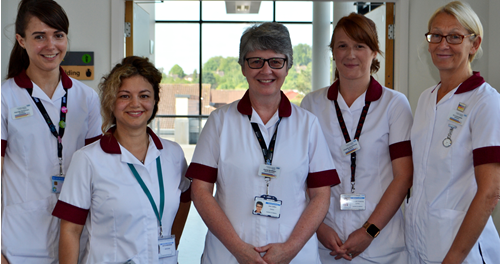Gastroenterology
Working within Gastroenterology, we provide patient care across both the ward and clinic setting, working closely with specialist nurses and doctors to provide the best results. We offer dietary advice to patients with a wide range of conditions such as Crohn's disease, ulcerative colitis, irritable bowel syndrome (IBS), pancreatitis, bacterial overgrowth and liver disease. We offer advice and support on dietary restrictions to help with gut-related symptoms, including reducing or increasing fibre intakes, whilst also offering guidance on specialist diets such as the low FODMAP diet. From experience, we recognise that no two patients with bowel conditions are the same and are happy to use our knowledge and skills to provide a tailored service to meet individual needs.
Stroke
There is a 31-bed hyperacute and acute stroke unit that accepts patients from a wide geographical area. Close links with therapy colleagues provide enhanced multi-professional working.
Respiratory
There are three respiratory wards and one of these has Non-Invasive Ventilation (NIV) beds. Royal Stoke specialises in PEG (Percutaneous Endoscopic Gastrostomy) insertion under NIV so is a specialist centre for people with Motor Neurone Disease. In addition the hospital and more specifically the respiratory, neurology and palliative care teams contribute to the MNDA (Motor Neurone Disease Association) Care Network and are developing an improved care pathway for these patients.
Cystic Fibrosis
The North West Midlands Cystic Fibrosis (CF) Centre is a designated centre providing care for children and adults with CF across North and South Staffordshire, Burton, Shropshire and Wolverhampton. The CF Specialist Dietitians are an integral part of the centre's paediatric and adult multi-disciplinary teams which contain motivated and highly skilled individuals. The high quality care offered by both teams and the excellent facilities were highlighted in a recent CF Trust peer review. Patients receive input from our teams during inpatient hospital stays, outpatient visits to clinic and care whilst at home. We cover a wide geographical area caring for nearly 140 patients and are part of monthly outreach clinics in Shrewsbury and Wolverhampton. As dietitians we also participate in providing training and education, regional and centre service meetings and weekly multi-disciplinary team meetings. We work closely with our diabetes team colleagues to ensure optimum care for our patients.
Diabetes
The diabetes team's work is a combination of out-patient clinic work, group work, training of other health professionals and in-patient work. We work with people with Type 1 diabetes, Type 2 diabetes and gestational diabetes. The team work with consultants and diabetes nurses to support people to understand diabetes and make lifestyle choices to help their condition.
Our Surgical Team

Trauma
The UHNM Major Trauma Centre is one of 22 adult centres in England providing care to those who have suffered a significant injury in the North West Midlands and North Wales. Our bespoke Acute Rehabilitation and Trauma Unit is one of the first hyper-acute specialised rehabilitation units to be developed within a Major Trauma Centre. Dietitians work as part of the multi-disciplinary team, providing individualised dietary advice to help patients achieve their maximum rehabilitation potential.
Oncology
The Oncology team provides nutritional advice to patients that are experiencing difficulties with eating, drinking or weight changes due to their cancer or treatment.
We can provide information on how the cancer and treatment may impact eating and drinking, along with tailored dietary advice to support patients to deal with some of the common side effects of cancer or treatment, such as taste changes, sore mouth, nausea, poor appetite, unintentional weight changes and adapting to a modified texture diet.
We see patients across a range of settings in the cancer centre, including on our inpatient wards, chemotherapy unit, radiotherapy centre and outpatient clinics both at Royal Stoke University Hospital and County Hospital. We work very closely with the wider multidisciplinary team and will regularly see patients alongside doctors, specialist nurses and speech and language therapists.
If you or someone you know are experiencing problems with eating or unintentional weight changes, speak with a doctor, nurse or healthcare professional at the hospital who can make a referral to our team.
For further information or helpful tips on eating, diet and cancer, click on the link below to view Macmillan's full range of diet resources:
Critical Care Unit
Critical care dietitians work with patients who have been admitted to the intensive care unit for the management of acute life-threatening conditions. This can include patients with a wide range of medical conditions e.g. following major surgery, trauma, severe infections and respiratory disorders. There is a 36-bed unit split over 4 pods. Dietitians in the team work very closely with the multi-disciplinary team including doctors, pharmacists, surgeons and nurses.
We also have a 16-bed cardiothoracic critical care unit which is also supported by the dietetic team.
Bariatric
The bariatric dietetic team delivers pre-operative dietary support and education in the outpatient environment to patients who are due to undergo bariatric surgery. We also see our patients when they are admitted for their operations and then follow them up for two years following surgery. Our input ranges from general healthy eating and weight reduction advice to dealing with deficiencies of specific macro and micro nutrients post-operatively. There are three dietitians and a dietetic tech in our team and we work closely as a multi-disciplinary team with bariatric clinical nurse specialists, surgeons, endocrinologists and anaesthetists.
Our Renal Team
We are a team of seven specialist dietitians. We help patients with kidney disease, working alongside the wider team and serving the Staffordshire and Cheshire areas.
We provide care to patients with all levels of kidney disease requiring dietary advice. This includes the following:
- Dialysis – We provide haemodialysis at Royal Stoke (this is our base unit) and we have two satellite units, County Hospital and South Cheshire. We also provide home haemodialysis and peritoneal dialysis
- On the ward
- Critical Care
- Patients with a kidney transplant
Dietary advice is individualised to each patient depending on their blood results, treatment plans and any additional medical conditions.
Our Paediatric Team
Our highly skilled team of paediatric dietitians work closely with clinicians and multidisciplinary teams in many specialties within the children's unit, advising on therapeutic diets or nutritional support for in-patients. They also attend multidisciplinary clinics with specialist teams and run busy dietetic-led outpatient clinics for a range of conditions, accepting referrals from local GPs and consultants at UHNM, for children and young people at the Royal Stoke and County Hospitals. Our aim is to provide patient-centred holistic care.
Our team is made up of a dedicated dietetic assistant and 11 paediatric dietitians, some of whom are nationally renowned for the work they do within their specialist areas, contributing to nutrition publications and national guidelines.
Specialist areas include Neonatology, Gastroenterology, Parenteral Nutrition, Home Enteral Feeding, Children's Intensive Care Unit (CICU), Eating Disorders, Diabetes, Prader Willi, and Cancer and Cystic Fibrosis. UHNM is a regional centre for Cystic Fibrosis.
Our County Hospital Team
At County Hospital we have a team of two dietitians and a dietetic assistant who provide a wide-ranging inpatient and outpatient service to patients who live in the Stafford area.
Inpatient services include dietetic support for acute medical conditions, endocrine conditions, care of the elderly and respiratory wards as well as the small critical care and busy chemotherapy unit. We pride ourselves on working closely with the active multi-disciplinary teams and close liaison with our catering team who produce patient food onsite.
We hold six outpatient clinics on a weekly basis. These cover general referrals and more specialist patient groups such as IBS/FODMAP and head and neck oncology patients.
Our Community Team
The community team consists of three dietitians. We hold clinics in a range of community locations and provided individualised dietary advice upon receipt of a referral from the GP. The GP can also request home visits for patients who are housebound and also for those who are in care homes. We work as part of the multidisciplinary community teams, liaising with district nurses, GPs, diabetes specialist nurses and speech and language therapists.

